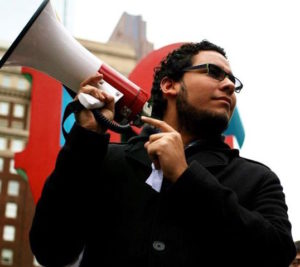Generocity asks: How does media literacy impact your work?
Though the definition of media literacy is broad: “the ability to access, analyze, evaluate, and create media,” many of us think of it primarily in terms of something to be taught in schools to help students be more savvy and thoughtful consumers of media.
But media literacy is an ongoing pursuit — and its impacts can be felt in our work, and the concerns we and our organizations seek to address though it. We’ve asked four nonprofit professionals to tell us how media literacy impacts the work they do, and the communities they work with.
1. Nikia Owens
“Information is power and the ability to use media is not only strategic but essential for those we seek to serve.
As the 2019 tax season recently closed I am reminded of the 2018 tax season and the role media played in supporting free tax preparation through the Volunteer Income Tax Assistance (VITA) program. United Way and its partner Campaign for Working Families served more than 36,000 low-to-moderate individuals and families through VITA (saving tax filers over $9 million in tax preparation and fees). United Way, Campaign for Working Families and the Philadelphia Department of Revenue have worked to increase the utilization of media to tackle serving the more than 40,000 taxpayers who do not claim the Earned Income Tax Credit (EITC), leaving over $100 million unclaimed each year. The EITC is significant in that it is the most effective anti-poverty fighting program in the country, with the ability to lower the poverty rate by several percentage points. Through the financial empowerment efforts at United Way, media will continue to play a critical role in helping to lift individuals and families out of poverty.”
Nikia Owens is the managing director of financial empowerment of the United Way of Greater Philadelphia and Southern New Jersey.
2. Jim MacMillan
“News consumers have to dig in a little to get a comprehensive grip on gun violence in America.
Many sources provide deeply contextualized reporting on the scope of the crisis and evidence-based solutions. But passive consumers will most often find themselves inundated with polarizing rhetoric and depressing, desensitizing and repetitive incident reports.”
Jim MacMillan is a Pulitzer prize-winning photojournalist, the founder of the nonprofit Gun Crisis Reporting Project, and a 2019 recipient of the prestigious Reynolds Journalism Institute Fellowship.
###
3. Miguel Andrade
“Doing communications for an immigrant-rights organization under the Trump administration gives you a renewed appreciation for media literacy.
With attacks against immigrant communities happening every day in this country, it’s important to be able to counteract the anti-immigrant rhetoric being thrown at us and elevate the voices of those who are most affected. My job is to not only analyze what the opposition is saying against my community but also train our people on how to combat some of the narratives that have become commonplace about undocumented immigrants. There’s nothing more powerful than seeing a community member learn how to craft and tell their own story in a way that is empowering and fights back against these narratives. We’re luchadorxs and we must use all the tools available for us, and that includes creating our own media and content.”
Miguel Andrade is the communications manager for Juntos, the community-led, Latinx immigrant rights organization in South Philadelphia.
4. Mark Strandquist 
“We believe that stories are the seeds of change, that until people are seen as fully human, the social services and policies that impact their lives will never truly support or reflect their full humanity.
In our work, we don’t tell people’s stories, but work with communities to develop the skills, tools, and networks to take control of their own narrative. Media literacy is a huge part of that because it’s important to understand how media functions in order to craft counter narratives. We use stories and art as a Trojan horse, as a tool to trespass into spaces that have historically silenced and excluded marginazalized voices. We focus on creating flexible media that isn’t limited to any medium, space, or audience. This has allowed us to amplify the stories, dreams and demands of the people we work with throughout a multitude of spaces — from museums and universities, to city hall, legal clinics, detention centers, media outlets, parades and public spaces.”
Mark Strandquiest is the co-director of The Reentry Think Tank and People’s Paper Co-op.
Project
Reentry Think TankTrending News










